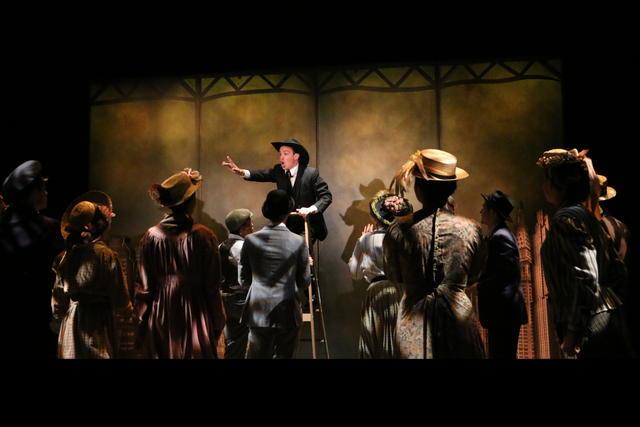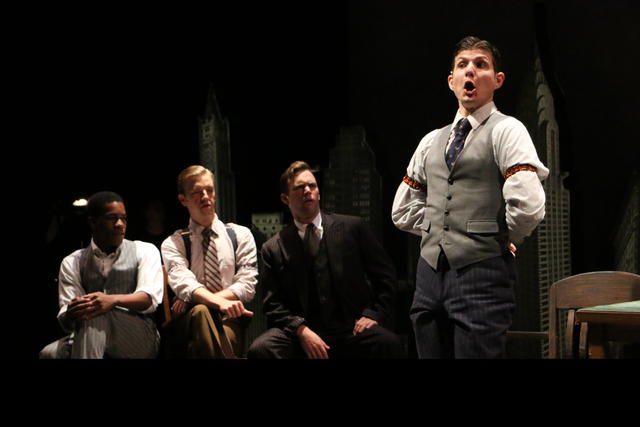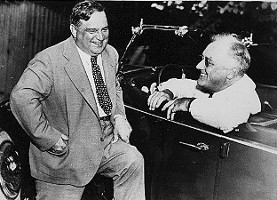A Small Guy With A Big Heart On A Small Stage
"Fiorello”
Book: Jerome Weidman and George Abbott
Music: Jerry Bock
Lyrics: Sheldon Harnick
Director: Bob Moss
Choreography: Michael Callahan
Musical Direction: Evan Zavada
Set: Carl Sprague
Costumes: David Murin
Lighting: Matthew E. Adelson
Sound: Brendan F. Doyle
Presented by Berkshire Theater Group at
East 13th Street Theater (Home to the Classic Stage Company)
136 East 13th Street
New York, NY 10011
Previews beginning Sunday, September 4, 2016
Opened: Friday, September 9, 2016
Closing: Friday, October 7, 2016
Running Time: 2 hours 30 minutes
See Performance dates below. Tickets can be purchased by calling
(413) 997-4444 or
Or online at www.BerkshireTheatreGroup.org
or www.fiorellomyc.com $59, $79,
$99
Reviewed: Thursday, September 15, 2016
Gone and mostly forgotten in all but name – think
LaGuardia Airport and the Fiorello H. LaGuardia High School of Music
& Art and Performing Arts – is his eminence Fiorello LaGuardia
(1882-1945), arguably the best mayor New York City ever had (1934-1945).
Thanks to Berkshire Theatre Group which shipped us,
cast and all, their highly touted summer hit musical from Stockbridge,
Massachusetts, the late great hizzoner is now back in town, this time
singing, dancing and tipping his hat in a joyous, high energy rival
of Fiorello.
A sensation from the moment it landed on stage, Fiorello opened on
Broadway in 1959 with a score by Jerry Bock and Sheldon Harnick (Fiddler
on the Roof, She Loves Me), and a book by Jerome Weidman and George
Abbott, the musical’s original director. It went on to win 3
Tony’s in 1960, one for best musical (in a tie with The Sound
of Music), another for direction, and a third for actor Tom Bosley
who played Fiorello. It also garnered a Pulitzer for an original American
play dealing with American life, the same award that mega-hit Hamilton
received in 2014.
 |
| Austin Scott Lombardi and Company
of "Fiorello" (NYC), BTG 2016. Photos by Alexander Hill |
The musical follows Fiorello’s political journey from the U.S.
House of Representatives to the office of Mayor. Sandwiched in between
scenes that extol his progressive agenda – he wanted to restore
the city’s financial health, expand the federally funded work-relief
program for the unemployed, and end Tammany Hall’s corruption
– are the sacred moments that he shares with his hard-working
secretary and loving wife. It is these scenes that supply much of
the play’s emotional content, as well as harboring the most
beautiful songs.
Commanding the lead character of Fiorello with a surfeit of energy
and a spirit to match is Austin Scott Lombardi. Of course, Lombardi,
who never ages during the two or so decades that this play covers,
is too young, and too handsome, to play Fiorello. However, given that
most people have no idea what Fiorello really looked like, Lombardi
does manage in high style to render this imposition null and void.
He also manages, when speechifying like LaGuardia himself who spoke
several languages, to throw in a few accurately sounding lines to
his supporters in Italian and Yiddish. His one solo number, The Name’s
LaGuardia, comes late in act two. Here he tells his constituents if
they want to rid themselves of the Tammany Hall crooks, a vote for
him at the poll will do the job.
While the males in the cast (as do the women), serve mostly as ensemble
characters, most play several roles, it is Ryan Morsbach who plays
Ben, a party boss and sometimes Fiorello advisor, and Dan Cassin,
as Floyd, a doltish cop, who get to play front and center. In the
song Little Tin Box, Ben and his cronies are busy offering hilarious
excuses to an imaginary judge as to why their bank accounts are exploding
with greenbacks. In Politics and Poker, we get a perfectly synchronized,
foot stomping, arm waving show stopping number, revealing how back
room politics work.
Though Cassin’s Floyd is funny throughout the play, using his
voice and body language to clownish effect, his sole major number
I Love a Cop, which comes in act one, performed in tandem with his
girlfriend Dora (Chelsea Cree Groen), is delightful. Singing this
same winsome song earlier in the play, this time alone, Groen, thinking
about her newly found love with Floyd sings “What a situation!
Ain't it awful? Life is really grim. I can only say that it's unlawful how
I feel towards him!”
In many ways, the play, though more ensemble than not, belongs primarily
to its two lead female characters, chief among them Thea (Rebecca
Bruder) who he meets when she is arrested for leading a strike of
women at a clothing factory where she works, and Marie (Katie Birenboim)
Fiorello’s extremely hard working and loyal secretary who is
secretly in love with him. It is their vulnerability, their extreme
joy and pain, vividly felt through their actions and heart-swelling
songs that we identify with. Wondering how she ended up marrying Fiorello,
the beautifully voiced Bruder, also a joy to watch, singing When Did
I Fall in Love comes to the conclusion that “It doesn't matter
when, why or how, as long as I love him now.”
Equally moving was Birenboim emotional rendition, both funny and sad,
of The Very Next Man. Growing older and still no husband she threatens
to marry the very next man who asks her. “You'll see,” she
sings, “next time I feel that a man's about to kneel he
won't have to plead or implore I'll say "Yes" before
his knee hits the floor.” Feeling desperate she adds, “And
if he likes me who cares how frequently he strikes me? I'll
fetch his slippers with my arm in a sling just for the privilege
of wearing his ring.”
Much of the success of this musical belongs to the technical staff,
the musicians, as well as the theatre’s space itself. With 171
seats, on three sides of the theater, the audience is never more than
6 rows away from the actors. Talk about intimacy. What gives this
musical an extra dollop of oomph is the theatre’s postage-size
stage on which all 22 actors in clock-like fashion, thanks to director
Bob Moss and choreographer Michael Callahan execute their moves beautifully.
 |
| (L to R) Julius Reese, Michael Brahce,
Ben Dallas Redding and Rylan Morsbach. "Fiorello" (NYC),
BTG 2016. Photos by Alexander Hil |
Adding to this mix is Carl Sprague’s simple but clever set which
consists of a floor covered with newspapers sporting the news of the
day and a background of stand-alone, cartoon-like facsimiles of New
York City’s most iconic buildings. Other set pieces, like chairs,
tables, and desks are quietly added and subtracted, scene by scene,
by the actors themselves.
Equally beguiling is Matthew E. Adelson’s ethereal lighting
which floods each scene, appropriately so, with a differently colored
hues while David Murin’s smart and wisely chosen unobtrusive
clothing that fit the period like a glove. Using a score arranged
by musical director Evan Zavada, the three musicians (two pianists
and a violinist) add the needed atmosphere to each scene and musical
number. If you want to leave the theater with a happy heart instead
of a heavy heart Fiorello is running through October 7, and now is
the time to book your seat.
Note: As amazing as it sounds in these foot-dragging partisan days,
Fiorello achieved most of his stated goals in his first hundred days
in office. It helped that FDR gave him 20% of the entire national
CWA budget for work relief. LaGuardia also collaborated closely with
Robert Moses, with support from the governor, Democrat Herbert Lehman,
to upgrade the decaying infrastructure. The city was favored by the
New Deal in terms of funding for public works projects. On the downside
(this critic is weighing in here), being something of a puritan, pulling
a Giuliani, if you will, LaGuardia put an end to the city’s
burlesque theaters. For those who want to know a bit more about this
5ft 2inch Italian Jewish Episcopalian, you could log onto https://en.wikipedia.org/wiki/Fiorello_H._La_Guardia.
To pay your respects you can visit Fiorello at the Woodlawn Cemetery
in the Bronx where he currently resides.
|
 |
Fiorello at his desk. |
LaGuardia with FDR |
